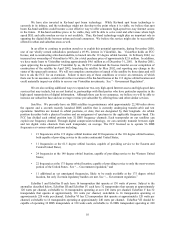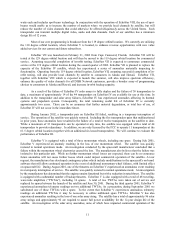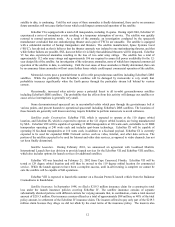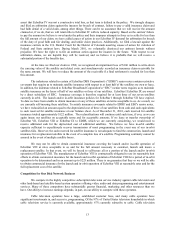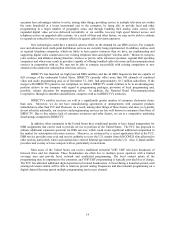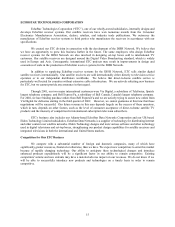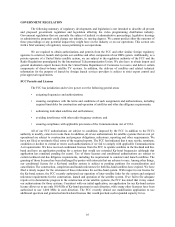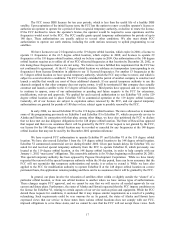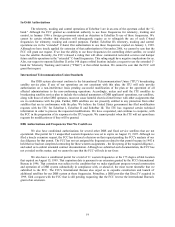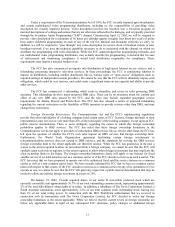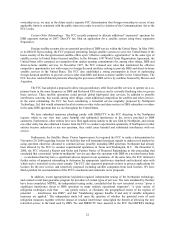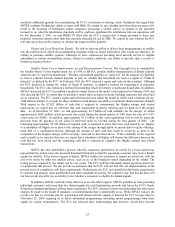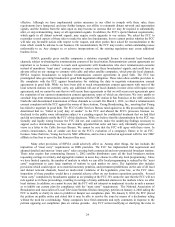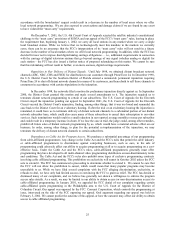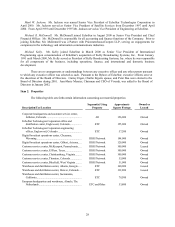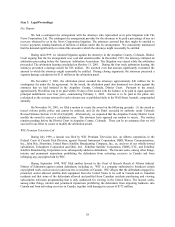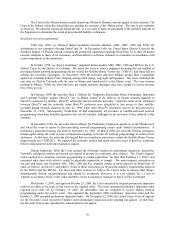Dish Network 2001 Annual Report Download - page 22
Download and view the complete annual report
Please find page 22 of the 2001 Dish Network annual report below. You can navigate through the pages in the report by either clicking on the pages listed below, or by using the keyword search tool below to find specific information within the annual report.20
We also have a conditional permit for 11 additional frequencies at the 175 degree orbital location, which
was set to expire on November 30, 1998. That expiration date was pursuant to an extension granted by the FCC’s
International Bureau in 1995. When it granted the extension, the FCC reserved the right to cancel the permit if we
failed to progress toward operation of the DBS system in accordance with the timetable that we submitted to the
FCC. That extension also is subject to a still pending challenge by PrimeStar.
While we have timely filed requests for extension of all the western permits, we cannot be sure how the
FCC will act with respect to these requests.
Regulations
DBS Rules. Once the FCC grants a conditional construction permit, the permittee must proceed with due
diligence in constructing the system. The FCC has adopted specific milestones that must be met in order to retain the
permit, unless the FCC determines that an extension or waiver is appropriate. Permittees must file semi-annual
reports on the status of their due diligence efforts. The due diligence milestones require holders of conditional
permits to complete contracting for construction of their systems within one year of grant of the permit.
Additionally, the satellites must be operational within six years of grant. For permits issued after January 19, 1996,
permittees must complete construction of the first satellite in their system within four years of grant of the permit.
The FCC also may impose other conditions on the grant of the permit. The holders of new DBS authorizations
issued on or after January 19, 1996 must also provide DBS service to Alaska and Hawaii from at least one of their
DBS satellites or they will have to relinquish their western assignments. We are presently not able to satisfy this
requirement from the 148 degree orbital location. With respect to the EchoStar I satellite, we have received a waiver
of that requirement subject to several onerous conditions. We have also requested other waivers of that requirement,
including a waiver to allow EchoStar II operation at the 148 degree orbital location. The state of Hawaii has
generally requested many conditions to such waivers. In addition, we are required to serve Alaska and Hawaii from
the 110 degree orbital location. While we believe that our current plan, which involves the use of our capacity at that
location for local-into-local broadcast as well as other programming, is in compliance with that requirement, there
can be no assurance that the FCC will consider this plan as complying with the rule. In general, the states of Alaska
and Hawaii have expressed views that our service to these states from various orbital locations does not comply with
our FCC-imposed obligations to serve those states, and we cannot be sure that the FCC will not accept these views.
Subject to applicable regulations governing non-DBS operations, a licensee may make unrestricted use of
its assigned frequencies for non-DBS purposes during the first five years of the ten-year license term. After the first
five years, the licensee may continue to provide non-DBS service as long as at it dedicates at least one-half of its
total capacity at a given orbital location to providing DBS service. Further, the FCC indicated its desire to streamline
and revise its rules governing DBS satellites. We cannot be sure about the content and effect any new DBS rules
might have on our business.
Certain Other Communications Act Provisions. As a distributor of television programming, we are also
affected by numerous laws and regulations, including the Communications Act.
The FCC imposes different rules for “subscription” and “broadcast” services. We believe that because we
offer a subscription programming service, we are not subject to many of the regulatory obligations imposed upon
broadcast licensees. However, we cannot be certain whether the FCC will find in the future that we should comply
with regulatory obligations as a broadcast licensee with respect to our current and future operations, and certain
parties have requested that we be treated as a broadcaster. If the FCC determined that we are a broadcast licensee, it
could require us to comply with all regulatory obligations imposed upon broadcast licensees, which are generally
subject to more burdensome regulation than subscription service providers like us.
Under a requirement of the Cable Act, the FCC imposed public interest requirements on DBS licensees,
such as us, to set aside four percent of channel capacity exclusively for noncommercial programming for which we
must charge programmers below-cost rates and for which we may not impose additional charges on subscribers.
This could displace programming for which we could earn commercial rates and could adversely affect our financial
results. The FCC has not reviewed our methodology for computing the channel capacity we must set aside or for
determining the rates that we charge public interest programmers, and we cannot be sure that, if the FCC were to
review these methodologies, it would find them in compliance with the public interest requirements.


